The Other Side of a Paris Restaurant Is Hell
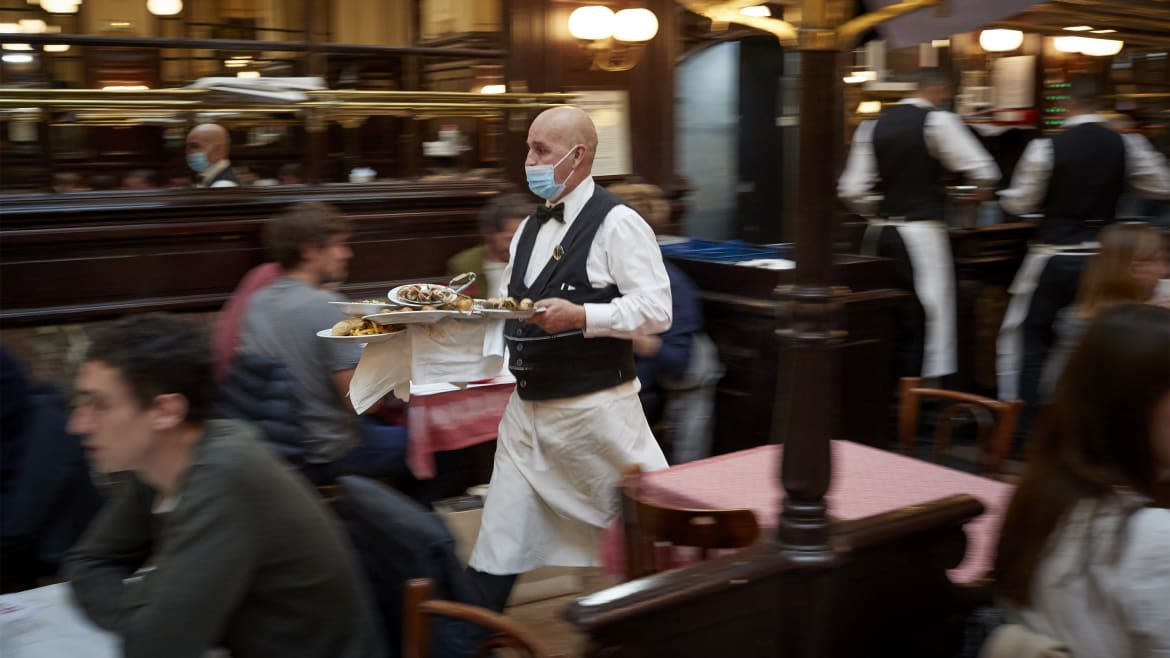
I feel a rising resentment of the restaurant’s approach to gastronomy. Yet, I increasingly admire the waiters. The pride in what they do. Their no-non- sense work ethic. The Sisyphean nature of the job: redemption through repetition. The camaraderie. The competition. Their relationship with money and the ephemeral. The way they feel part of a great lineage, of something distinctly French. That they, unlike the rest of the citizens of the city, know something special. A secret order of magicians, perhaps. Just a lot less glamorous.
Because, if a waiter is doing his job correctly, he will be manipulating your perception of reality. He is, to all intents and purposes, an illusionist and his job is to deceive you. He wants you to believe that all is calm and luxurious, because on the other side of the wall, beyond that door, is hell. He is, in effect, the living example of the façade.
The management are always in a high state of anxiety because, for the restaurant to fulfil its role and provide the illusion of luxury that everyone in the dining room expects, the innards must come out. Out of the darkness, across the thin divide and into the world of the living. This puts the restaurant at its most exposed. Everything else happens out of sight: it suffices just to allude to ‘the chef’ and the diner will paint the picture themselves, which doubtless will not include a dozen emaciated immigrants being barked at by stressed Tamils or a scimitar-wielding Corsican.
The waiters are the weak point in this chain, emissaries from the Underworld sent out like yo-yos on the understanding that they will return, and in the meantime play their role and perpetuate the illusion. But a waiter isn’t a soldier – as we know, he’s a bounty hunter, and the restaurant pays him enough to ensure he can live his itinerant existence, but never enough for him to escape definitively. So, he steals and cheats and charms his way to whatever he can get, and this is why you pay him a tip. It’s a tax, given on the understanding that he will perform his role to the best of his abilities as an actor, bounty hunter, stage manager, bully and everything else you want him to be so that your food arrives just as you’d expected it. You are paying him so that you get better service than the other tables. So, don’t think the world behind that door has nothing to do with you. Just like us, you are complicit.
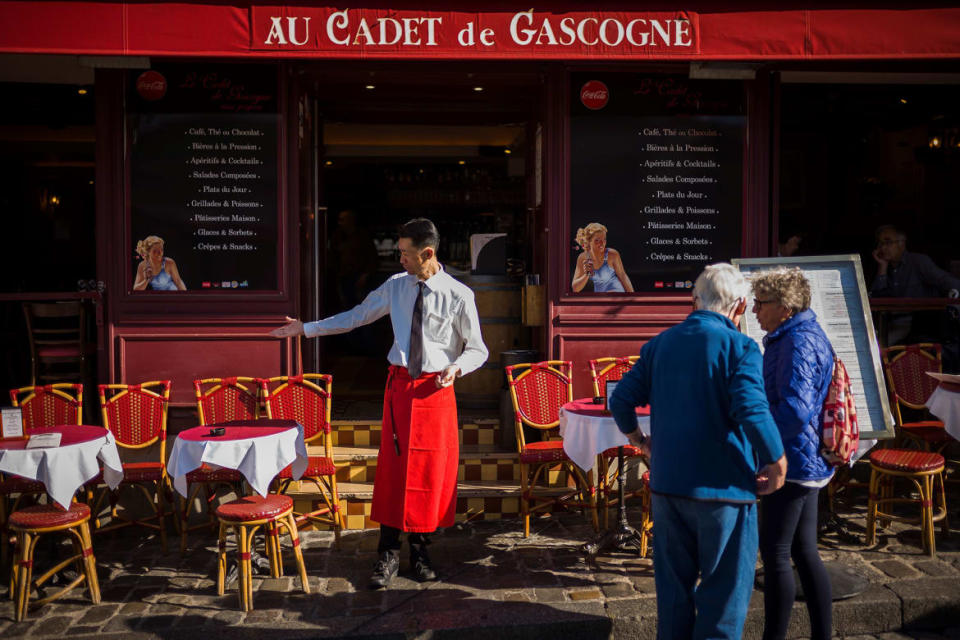
A waiter shows empty tables to customers at a restaurant’s terrace on the Place du Tertre in Montmartre on March 30, 2017, in Paris.
Running a restaurant is an exercise in driving down costs while serving the outcome with a straight face – and in Paris, just as in other cities, towns and villages, this is being entrusted to a group of delinquents. Men who for whatever reason have fallen into the waiting game. The only way to manage such a situation is to strip each person’s role down to its constituent parts. Like engineers on a secret project, no one ever has the whole picture. In the prep kitchen there are men who are assigned specific dishes; just as on a production line, they will spend their day boiling eggs or toasting bread, while plongeurs wash, cooks are tasked with specific meats, the waiter serves. (There’s a man in the lower kitchen whose job on weekends is to parboil eggs, hundreds of them, and lay them on ice so that they can be dropped back into the hot water for a second once another eggs Benedict is ordered.) However, the waiter is unique, because he must also have contact with the clientele and, of course, the other important thing: the money.
As the service unfolds the waiter’s wallet begins to bulge with takings,
each order has been logged and will be checked off at the end of the day, but until that point the money is his. A man you pay the minimum wage (the amount that someone has deemed the absolute legal minimum necessary to live in this city) has all the business’s money. The waiters are treated with suspicion by every other employee for exactly this reason, but every station has its kick-back – you rarely see a cook go hungry, despite the management’s best efforts, whereas the waiters must eat what has been rejected by the diners, like vultures.
I have been in the restaurant a few months now and I have no desire to leave. Not yet, perhaps never. I am strangely drawn to the world of the waiters; there is something ancient about it: waiting in Paris, with all the rituals – it intrigues me. And I am slowly being let in, becoming one of them, part of the brotherhood. I want to become a waiter, to have their respect, and my own. The prospect of an unpaid London internship (if I was lucky), tasteless supermarket sandwiches in front of a computer for lunch and a return to sofa-hopping wouldn’t be a patch on living in Paris. Even when you’re exhausted, broke and hungry, there’s still an indefinable magic about the place. And no matter how much your feet hurt after a never-ending shift, how physically dead you feel as you walk up the Avenue de l’Opéra at night, or across the Seine under the shadow of Notre-Dame, inside, you can’t help but feel intensely alive. Because you’re in it, you’re in the film. You’re not watching, you’ve got a walk-on, speaking part. And everything feels possible. Besides, when you’re in Paris you couldn’t care less about anywhere else. Your world shrinks; it’s the centre of the universe. There is nowhere else.
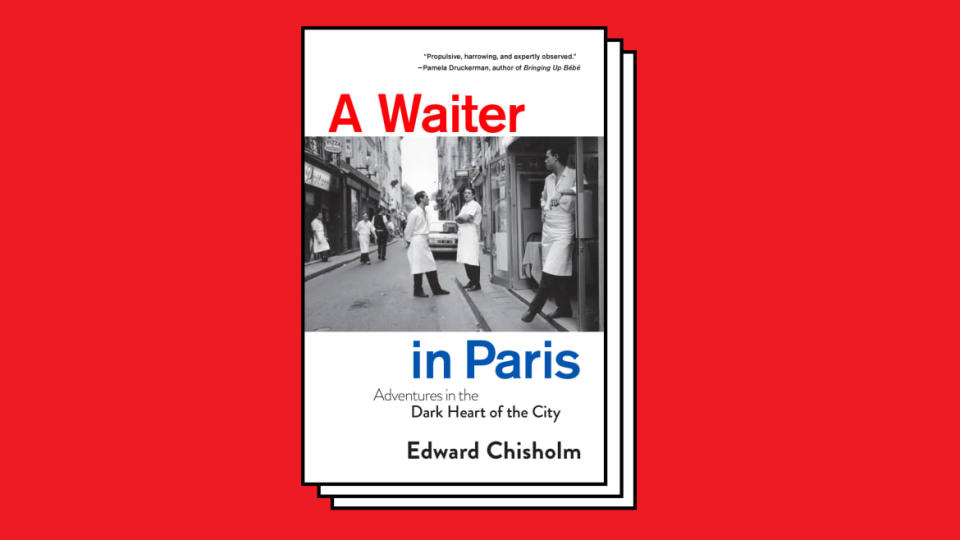
Having understood how to operate as a runner, and therefore get a cut of the waiters’ tips, I now find that I always have cash, even if it is a lot less than the waiters have. Dirty old bills stuffed in our wallets. If we spend them on food, of course it is always in the cheap local bistros where a faux-filet frites costs nine euros and a carafe of the house wine five. This is the waiter’s way. ‘Eat where they can tell you where the food comes from and that they cooked it themselves’ is his hard-learned motto. That and ‘“Paying for the view” is a completely unacceptable approach to eating.’
Drinking takes place in dive bars or PMU bars after services, when, unable to sleep despite the physical fatigue, we consume rounds of drinks to calm the nerves. A waiter appears to have no real social life. You are condemned to work society’s social hours and as such your world becomes the restaurant and the people in it. Adrien says that if he ever has enough time to take a girl out for a drink it is for two pints of La Chouffe, which has the equivalent strength of four, and that is it.
"After four we’re both interested," he says dryly.
The money, of course, disappears as quickly as it comes in, and there is never anything to show for it apart from the occasional haircut, fags or hangover. Of course, we all kick ourselves for spending it when we hit a dry patch and don’t make any good tips for a while, yet this seems to be the reason to spend it freely when we have it.
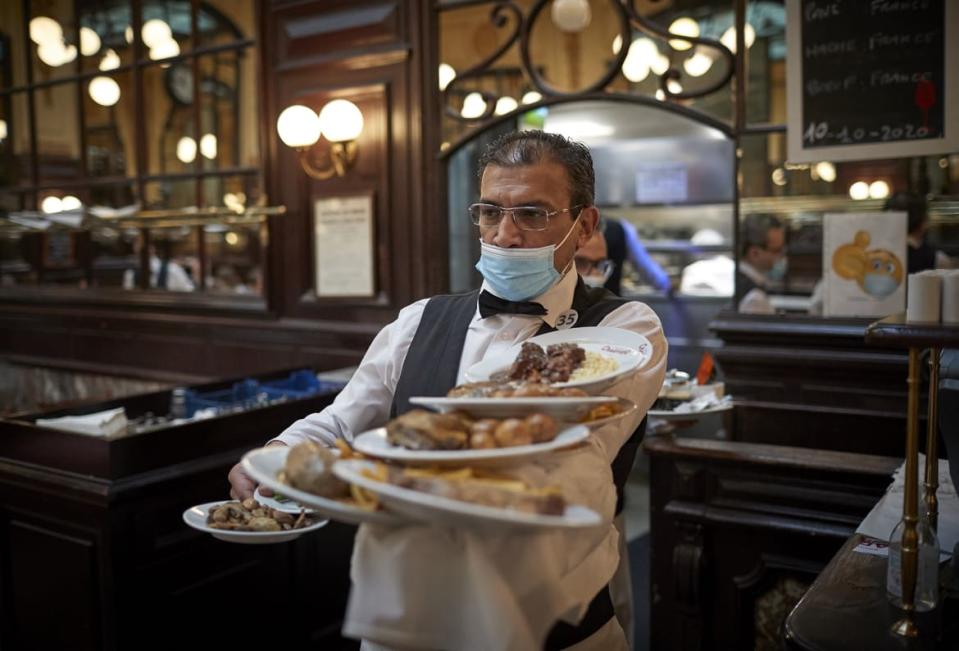
A waiter during service at the Chartier Bouillon Restaurant near Grands Boulevards on Oct. 10, 2020, in Paris.
The waiter, despite his lowly status, is unique. As the penultimate link in the chain that connects you, the diner, to the paperless immigrant scrubbing plates, the waiter is forced into an unbearable position. A position from which only physical action can offer a redemptive escape. He has no choice but to finish the job that was started by the others some- where below ground. To continue the reaction and play his part in the game. Up and out of the infernos, only to return again.
I think about all this as I stand in the street smoking before a dinner service on a Friday night. Green-and-white buses move laboriously through the evening traffic, lights reflected in their opaque windows. They stop regularly, disgorging their human cargo into the river of silhouettes that move quickly in the darkness towards unknown destinations. There’s that buzz of the weekend, the stench of free time. Occasionally you see a face, before it turns and fades into the evening. Each expression a glimpse into France; if only you can seize it for long enough – if only you can see enough of them.
Paris is not France; yet all of France can be found in Paris. It is the monumental city. The centre of the wheel. Imagined by great men and hewn by the currents of history like cliffs on a battered coastline. In Paris the street names are the same as those in every French village: Boulevard Ney, Avenue Foch, …de Gaulle, …Jules Joffrin, …Gambetta, …Victor Hugo, …Voltaire and so on. Today’s greats will have a public swimming pool or library named after them.
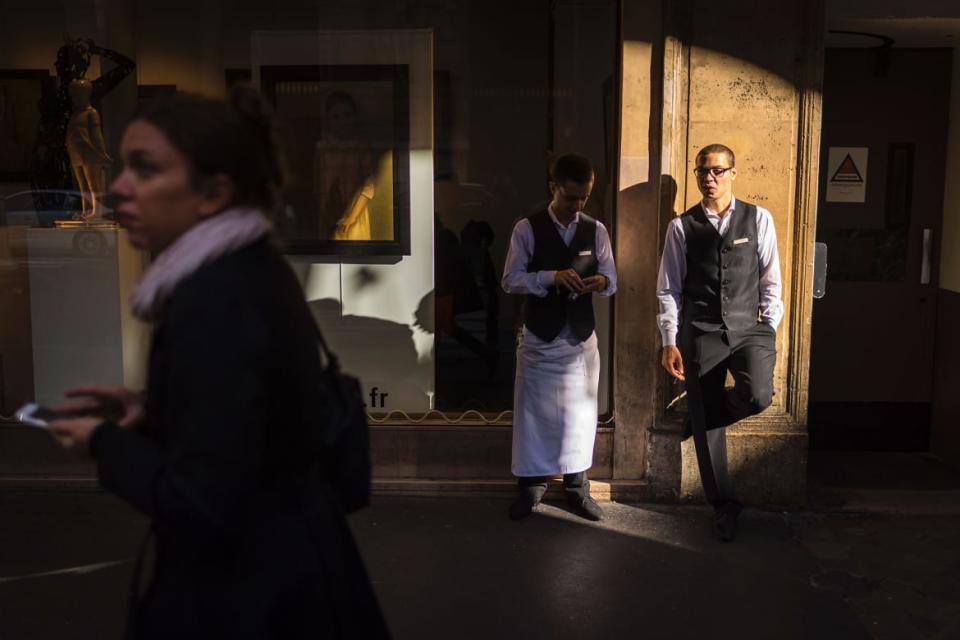
Waiters enjoy the sun as they stand in the Rue de Rivoli in Paris on Oct. 20, 2016.
In Paris the grandeur of the monumental punctuates the intimate. Edifices to God, wars or thinkers, vast squares and parks. All of this overlooks the narrow streets of boulangeries, pharmacies, Thai massage parlors, rubbish, tabacs, graffiti, estate agents, dog shit and phone shops--the thread that ties together the twenty quartiers of the city. It is in these places that the people work. The people whose lives are played out below the indifferent regard of the city’s monuments. Paris cares little for them, for she has seen them all before and will see many more afterwards. Indifferent because the city knows she will remain, even if just in the imagination. You feel it as you walk around. There are few other cities that offer such great panoramas as you go to work. It is both epic in its proportions and intimate. Even visitors to the city feel it; you can tell by the way they dress. How many other cities inspire people to dress well?
Right at the centre of this giant wheel that is Paris is the Bistrot de la Seine. A microcosm of the city, of the country as it is today. Replete with a defined social hierarchy cemented neatly in place by the physical layout of the restaurant. On the surface all is light, but the deeper one travels, the darker things become.
Excerpted with permission from A Waiter in Paris: Adventures in the Dark Heart of the City by Edward Chisholm. Published by Pegasus Books.
Get the Daily Beast's biggest scoops and scandals delivered right to your inbox. Sign up now.
Stay informed and gain unlimited access to the Daily Beast's unmatched reporting. Subscribe now.

 Yahoo Movies
Yahoo Movies 
